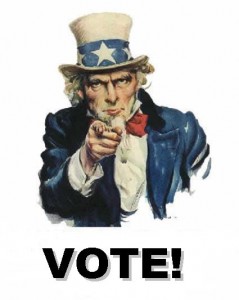 “Vote for Pedro!” Sound familiar? For farther advanced generations it was the slogan to a worthless movie of a younger generation. To that younger generation, which happens to be mine, it was simply– a fad. In seventh grade, wearing a “Vote for Pedro” shirt from the movie, Napoleon Dynamite, was “the-in-thing.”
“Vote for Pedro!” Sound familiar? For farther advanced generations it was the slogan to a worthless movie of a younger generation. To that younger generation, which happens to be mine, it was simply– a fad. In seventh grade, wearing a “Vote for Pedro” shirt from the movie, Napoleon Dynamite, was “the-in-thing.”
In the movie, Napoleon (a school outcast) tries to help his friend (Pedro) win the election for school president—hence, “Vote for Pedro!” Through a serious of random and unconnected events, Pedro wins the election and the movie somehow ends in a happily ever-after. It’s strange that so many teenagers were crazy about a pointless movie about “an eccentric high school student from Preston, Idaho who lives with his grandmother, his older brother Kip, and their pet llama, Tina.” The only good thing that came out of watching Napoleon Dynamite was a sudden realization of the brevity of my earthly life. “I just wasted 90 minutes of my life and I can’t take it back.”
Luckily for us, life is not pointless nor are elections the random product of a series of pointless events. Thankfully, we are not confined to the bizarre imagination of Hollywood script writers in our efforts to elect a president to lead the United States. Every citizen has a vote in his hands and the resources to decide to whom he will give that vote. Yet, surprisingly 6 out of every 10 people of the eligible-to-vote population choose not to vote. Each vote matters. In the recent Iowa caucus, Rick Santorum won by a narrow margin of 34 votes! It’s easy to wonder who the hundreds of Iowans who did not vote would have voted for; certainly, their votes (even only 34 of them) would have tipped the scales. History is in the making, the future is in the making, and it starts with each person’s vote.
Not only is simply voting important, but there is also the stress of the importance of the Catholic vote. In the past decades, Catholics have had a tremendous influence on who gets voted into the presidential office. Below are the winners of the Catholic vote from the past sixteen presidential elections with the approximate percentage of the Catholic vote they received.
Source: George J. Marlin and Michael Barone, American Catholic Voter: Two Hundred Years Of Political Impact (2006)
- 1948 – Harry Truman won the Catholic vote 65%
- *1952 – Adlai Stevenson won the Catholic vote 51%
- 1956 – Dwight D. Eisenhower won the Catholic vote 55%
- 1960 – John F. Kennedy won the Catholic vote 82%
- 1964 – Lyndon B. Johnson won the Catholic vote 78%
- *1968 – Hubert Humphrey won the Catholic vote 55%
- 1972 – Richard Nixon won the Catholic vote 63%
- 1976 – Jimmy Carter won the Catholic vote 56%
- 1980 – Ronald Reagan won the Catholic vote 50%
- 1984 – Ronald Reagan won the Catholic vote 56%
- *1988 – Michael Dukakis won the Catholic vote 52%
- 1992 – Bill Clinton won the Catholic vote 44%-35% (Bush),20% (Perot)
- 1996 – Bill Clinton won the Catholic vote 53%-37% (Dole), 9% (Perot)
- *2000 – Al Gore won the Catholic vote 50%
- 2004 – George W. Bush won the Catholic vote 52%
- 2008 – Barack Obama won the Catholic vote 54%
* Note: Exceptions were in 1952, 1968, 1988 and 2000.
As seen in the past 16 presidential elections, Catholics chose the winner 12 times. These striking statistics show that voter participation, and especially that of Catholics, does matter. Elections are determined by the people and for the people.
First, by exercising one’s right to vote, and secondly, by voting for the right candidate, every person can make a difference in the future of the US. Just look at how the United States has changed in the past presidency. President Obama’s election was not decided by one single person or by a random series of events. He was elected into office by the votes of the American people.
Maybe, after all, there is a message behind Napoleon Dynamite: if a socially awkward and introverted teenage boy is willing to do everything he can to get his friend elected as school president, convincing everyone to “Vote for Pedro!” we, even more so, should take elections seriously. By casting our votes this year, we have the power to decide who is the next president of the United States.
